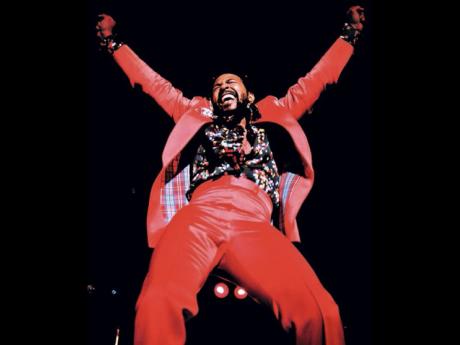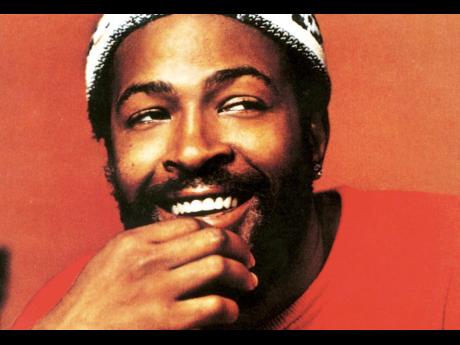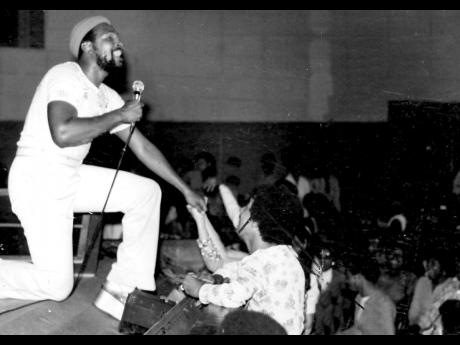The Music Diaries | Genuinely smart, or outrageously stupid? - Marvin Gaye defied the odds
The stigma attached to All Fools' Day (April 1) remains a very real and perennial one.
People have expressed divergent views about the character of persons born on April 1, with the general consensus being that such persons are either genuinely smart or outrageously stupid.
Marvin Gaye, the Motown Records recording star, defied the odds by fitting both descriptions. He missed that birth date by hours, but paid the price for his foolish behaviour when he was killed by his father on All Fools' Day 1984.
Gaye was an extremely gifted entertainer who played instruments on many early Motown hits before blossoming into one of the entity's and the world's most outstanding vocalists.
Among a host of other entertainment personalities born on that date are Jamaican film actor/vocalist Jimmy Cliff, in 1948, and the Texas-born actress/vocalist Debbie Reynolds, in 1932.
One would not readily consider Gaye to be a fool, however, after he skillfully negotiated his way into the heart of Anna Gordy, sister to Motown boss Berry Gordy. He married her in 1963. The move gave him special privileges, being the boss' brother-in-law. With his family ties now established to go along with his immense talent as a drummer, he was included in the musical ensemble that backed many of the early vocalists. In the meantime, he ventured into songwriting, and, with encouragement from the experienced and charismatic vocalist Smokey Robinson, Gaye made his debut as a songwriter with Beechwood 45789 by the Marvelettes.
Gaye's climb to that first rung of the musical ladder was not without hard work, dutiful preparation and some amount of luck.
Born in Washington DC on April 2, 1939, Gaye got his earliest exposure to music when he sang in church. He soon learnt the piano by ear, and, by his early teens, had developed into a fairly competent church organist and drummer.
By the mid to late 1950s, he had become a member of an R&B vocal group called The Marquees. This move was crucial and, in fact, represented the real turning point in Gaye's career as he met Harvey Fuqua, leader of the Moonglows singing group, and who had ties to Motown Records.
Fuqua further enlisted the services of The Marquees to do backing vocals for his group, and they recorded Mama Loocie in the late 1950s, giving Gaye his first solo lead on a recording. Fuqua then took Gaye to Motown Records and negotiated a recording contract for him, which included the sales of his labels and recordings. He was initially hired as a session drummer in 1962.
After bombing with his debut vocal album, The Soulful Moods of Marvin Gaye, Gaye adopted a more soulful style and had his first set of successes with Hitch Hike, Pride and Joy and Stubborn King of Fellow, which, appropriately, defined his character and signalled his demise.
His hit run continued in the mid-1960s with Ain't That Peculiar and I'll Be Doggone.
A SEX SYMBOL
Enhanced by his good looks and charming personality, Gaye developed an association with the Motown ladies - Mary Wells, Kim Weston, Diana Ross and Tammi Terrell - which thrust upon a this sex symbol image that seemed to haunt him.
In his autobiography, Gaye is quoted as saying: "Women expect so much of me. They have made me into this sex symbol until sometimes it just messes with my head."
Utilising his sex symbol image, Gordy paired Gaye with these leading Motown ladies to produce some astounding hits. Mary Wells was the first as she sang in tandem with Gaye the 1964 Motown masterpiece Once Upon a Time:
"Once upon a time I almost lost my mind
I was lonely, so lonely, once upon a time
Hoping every day things would go my way
Then you came into my life
Now everything is fine".
With Kim Weston, he did It Takes Two, while he had multiple successes with Tammi Terrell on the cuts I'm Your Precious Love, Ain't Nothing Like The Real Thing, You're All I Need To Get By and Ain't No Mountain High Enough.
Terminally ill, Terrell collapsed and died in Gaye's arms in 1967. After such solid propinquity with the opposite sex, it is difficult to understand the view expressed by some pundits that Gaye had 'gone the other way'.
Gaye's solo hits were no less successful. How Sweet It Is, Too Busy Thinking About My Baby, I Heard It Through The Grapevine, Ain't That Peculiar and others kept rolling out of Motown in a way not dissimilar to the way motor cars rolled off the assembly lines in early Detroit (also known as Motor Town, from which Motown got its name).
By the early 1970s, Gaye had transitioned into social commentaries and hit the airwaves with What's Going On, Mercy Mercy Me, What's Happening Brother, Save The Children and God Is Love. But perhaps his best-known recordings were Let's Get It On in 1973 and the Grammy-winning song Sexual Healing in 1982.
A year later, he made the impolitic mistake of moving into his father's house. It was nothing short of an act befitting a foolish man, when one recalls the lifelong animosity that existed between both men. The pessimists and superstitiously inclined believed that the All Fools' Day syndrome had played a prank on him. In a 1984 All Fools' Day fracas with his father, the younger Gaye was shot dead. He was one day short of his 45th birthday.



